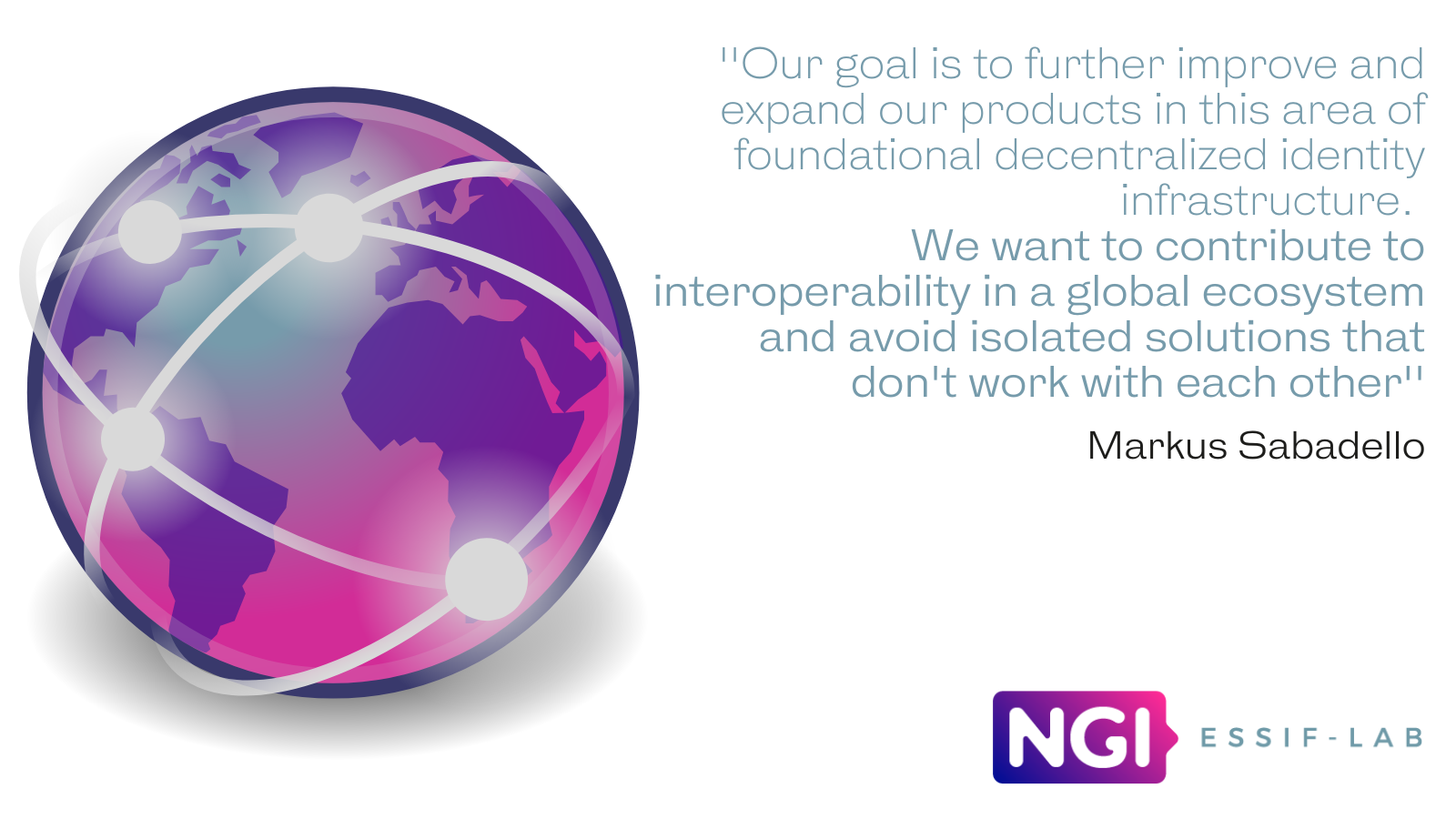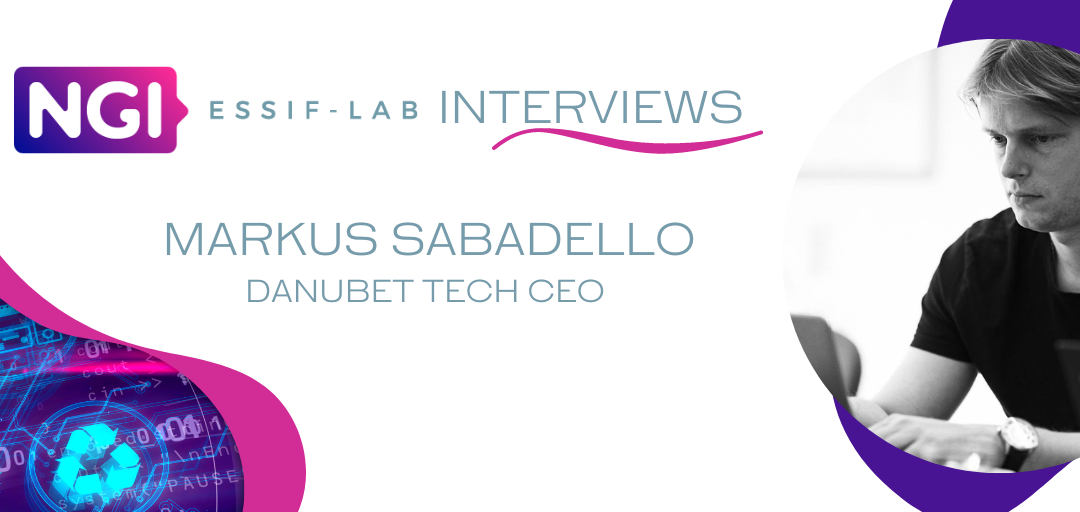Danube Tech is building the Universal DID Saas, a hosted platform that allows developers to create, update, resolve, and deactivate Decentralised Identifiers (DIDs), as well as to perform several other advanced DID-related operations.
This company has participated in two of the the eSSIF-Lab Open Calls_ the Business-oriented Open Call and the Infrastructured-oriented Open Call.
We’ve had the pleasure to interview, Markus Sabadello, Danube Tech CEO, who has talked to us about what they have been able to achieve so far in his company since its participation in eSSIF-Lab project and what goals they want to accomplish in the medium or long term.
1. Please introduce yourself and tell us what your company is about.
My name is Markus Sabadello, I have a relatively large background of working on decentralised identity ideas and technologies. At Danube Tech, we are working on open-source software and commercial products that make it easy for others to build decentralised identity applications and services. Our priorities lie in implementing lower-level infrastructure components in the area of Decentralised Identifiers (DIDs) and Verifiable Credentials (VCs). What makes us special is that we put a strong emphasis on interoperability.
To be specific, we try to build technical components that work with different decentralised identity networks, different credential and proof formats, and different protocols. We focus less on building a single, isolated product that we can sell, and more on being part of a larger community and collaborating with others.
2. What services or products do you offer?
On the open-source side, we offer Java libraries that implement DIDs, VCs, Linked Data Proofs, CBOR-LD, and others. These libraries are generic and can be used by developers to build higher-level applications and services. Work on these software libraries has been supported by an ESSIF-Lab IOC2 grant. Two additional open-source projects, which are closely related to this, are the Universal Resolver (see https://uniresolver.io/) and Universal Registrar (see https://uniregistrar.io/). These projects are quite well-known in the decentralised identity community and have received many contributions. Together, these tools provide an abstraction layer on top of different decentralized identity networks, such as Sovrin, EBSI, IDunion, Indicio, ION, Cheqd, Veres One, and many more. We see this work as an important contribution to building a globally interoperable ecosystem, and to avoid fragmentation of different efforts. As I mentioned before, with our work we are primarily focusing on low-level, foundational infrastructure.
On the commercial side, we are building production-grade enterprise products around the open-source projects. This is sometimes called an “open core” model. The products we are building can be used by companies and governments that want to adopt DIDs, VCs, and related technologies. One of these products is a Software-as-a-Software (SaaS) offering called Godiddy (https://godiddy.com/). This has been supported by an ESSIF-Lab Business Oriente Open Call grant and was originally called “Universal DID SaaS”. Godiddy is a hosted platform that makes it easy for developers and solution providers to work with DIDs.
3. What milestones have you achieved so far since your project launch?
In our eSSI-Lab IOC2 project, we managed to release “complete” versions of most of our open-source libraries, and to continuously maintain them, since some of the underlying standards are also still evolving. We actively maintain these libraries, since we use them in our own products, and many others in the decentralised identity community use them as well. We also frequently participate in community activities such as developing test suites, or participating in interoperability events (plugfests).
In our BOC1 project, we have by now launched our Godiddy service as a working product, and we have paying customers. We also continuously maintain and expand the functionality of this product, for example by adding support for additional decentralised identity networks.
4. What have you achieved with your idea thanks to eSSIF_Lab project?
As mentioned in the previous answer, we managed to significantly advance both our open-source libraries and our Godiddy product to the point where both are actively used by other members of the decentralised identity community, as well as by important customers who are building their own applications and services for solving real-life use cases. You could say that eSSIF-Lab has really helped our company to evolve from merely building experimental tools, to a serious and ambitious actor that plays its part within a larger ecosystem, and hopefully helps SSI become successful on a large scale. During eSSIF-Lab, we were able to expand our team and grow the company.
ESSIF-Lab has also helped us to generate additional visibility for our work. And of course another important benefit of eSSIF-Lab (besides the funding and visibility) was the interaction and collaboration with other eSSIF-Lab subgrantees, and the support of the eSSIF-Lab consortium itself.
5. What are your goals for the middle/long-time future?
We believe that DIDs will become as important on the Internet as IP addresses or domain names are today. Our goal is to further improve and expand our products in this area of foundational decentralised identity infrastructure. We want to contribute to interoperability in a global ecosystem and avoid isolated solutions that don’t work with each other.

We will continue to play an active role in standardization and community groups such as the World Wide Web Consortium (W3C) and Decentralised Identity Foundation (DIF), to make sure SSI is built on solid technical specifications. Our goal is also to further grow the company and become a leading provider of solutions for DID and VC technologies.
6. Any piece of advice for those who are looking for public funding?
I’m not an expert on this, but I would say:
- Be optimistic – try again if an application doesn’t succeed at first, since rejection can happen for various reasons and doesn’t mean that your idea is bad.
- Be honest – I have seen grant applications that contain outright lies, which is not fair towards the rest of the applicants, and ultimately not good for yourself.
- Be grateful – I have heard people complain about the bureaucracy associated with public funding, but I think it’s not too much to ask to make an effort to get support for your project.
If you want to know more about Danube Tech work and services, check its website here.

